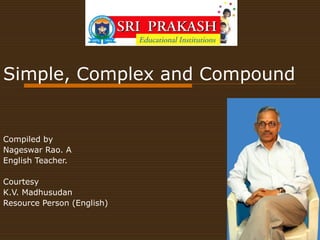
Simple, complex and compound
- 1. Simple, Complex and Compound Compiled by Nageswar Rao. A English Teacher. Courtesy K.V. Madhusudan Resource Person (English)
- 2. too - to 1. The old man is very weak. The old man is too weak to walk. 2. He cannot walk. 1. The box was very heavy. The box was too heavy for the boy to 2. The boy could not lift it. lift. 1. The little boy is very The little boy is too naughty for his naughty. parents to bear with. 2. His parents cannot bear with him.
- 3. very – so / therefore 1. The old man is very The old man is very weak, so he weak. cannot walk. 2. He cannot walk. 1. The box was very heavy. The box was very heavy, so the boy 2. The boy could not lift it. could not lift it. 1. The little boy is very The little boy is very naughty, so his naughty. parents cannot bear with him. 2. His parents cannot bear with him.
- 4. so - that - not 1. The old man is very The old man is so weak that he weak. cannot walk. 2. He cannot walk. 1. The box was very heavy. The box was so heavy that the boy 2. The boy could not lift it. could not lift it. 1. The little boy is very The little boy is so naughty that his naughty. parents cannot bear with him. 2. His parents cannot bear with him.
- 5. too – to very – so/therefore so - that -not 1. The old man is too 1. The old man is very 1. The old man is weak to walk. weak, so he cannot walk. so weak that he cannot walk. 2. The box was too 2. The box was very 2. The box was so heavy for the boy to heavy, so the boy could heavy that the boy lift. not lift it. could not lift it. 3. The little boy is too 3. The little boy is very 3. The little boy is naughty for his naughty, so his parents so naughty that his parents to bear with. cannot bear with him. parents cannot bear with him.
